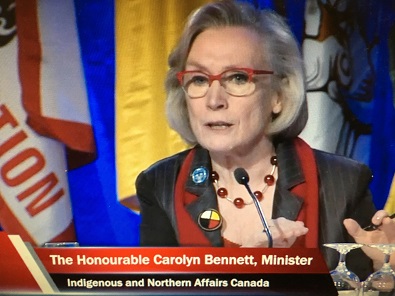Indigenous Affairs Minister, Carolyn Bennett. Photo courtesy of afn.ca
Indigenous Affairs Minister, Carolyn Bennett, took a bit of heat today at a National Chiefs Conference underway in Quebec.
She was told that not only should the Indian Act be scrapped, but her entire department should vanish under a new era that would see each of Canada’s 634 First Nations deal directly with government departments and agencies.
Bennett took the criticism in stride and agreed with the delegates who called for the implementation of a true, “nation-to-nation” relationship.
What that means is that each of Canada’s 634 First Nations negotiate independently and directly with federal departments on issues ranging from education, to child welfare and resource management.
One of the delegates explained why the current system does not work.
“It’s totally ass backwards, it’s gotta change, that paradigm has got to change,” he said. “If you want to renew this relationship, it’s nation-to-nation with Canada and the First Nations.”
Bennett agreed, saying her department wants to help First Nations become independent and self-sustaining, with less oversight and control from her department, but she says it will take time.
“I couldn’t agree more,” she said. “This is a transitional time.”
The National Chief of the Assembly of First Nations, Perry Bellegarde, is a major crusader for nation-to-nation. He says the AFN is a lobby group, but does not represent the interests of each First Nation.
“We are just worker bees, we’re just trying to facilitate and advocate things like policy and legislative changes,” he said. “So I want to make that clear, we want to continue moving toward that nation-to-nation relationship with the crown.”
Less than half of Canada’s Indigenous people live on reserves. They are represented by the AFN. Non-status and off-reserve Aboriginal people are represented by the Congress of Aboriginal Peoples, while Metis people are represented by their own organization.
